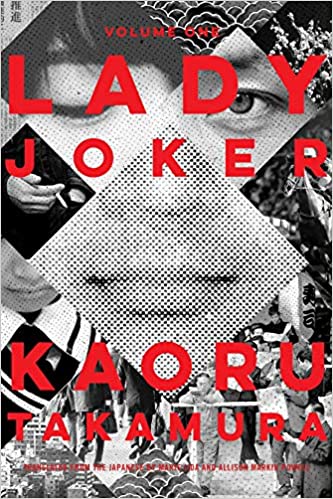Kaoru Takamura
One of Japan’s great modern masters, Kaoru Takamura, makes her English-language debut with this two-volume publication of her magnum opus.
Tokyo, 1995. Five men meet at the racetrack every Sunday to bet on horses. They have little in common except a deep disaffection with their lives, but together they represent the social struggles and griefs of post-War Japan: a poorly socialized genius stuck working as a welder; a demoted detective with a chip on his shoulder; a Zainichi Korean banker sick of being ostracized for his race; a struggling single dad of a teenage girl with Down syndrome. The fifth man bringing them all together is an elderly drugstore owner grieving his grandson, who has died suspiciously after the revelation of a family connection with the segregated buraku community, historically subjected to severe discrimination.
Intent on revenge against a society that values corporate behemoths more than human life, the five conspirators decide to carry out a heist: kidnap the CEO of Japan’s largest beer conglomerate and extract blood money from the company’s corrupt financiers.
Inspired by the unsolved true-crime kidnapping case perpetrated by “the Monster with 21 Faces,” Lady Joker has become a cultural touchstone since its 1997 publication, acknowledged as the magnum opus by one of Japan’s literary masters, twice adapted for film and TV and often taught in high school and college classrooms.
Ben on Goodreads wrote:Okay, EITHER this is the brilliantly written, marvelously intricately styled, wonderously translated masterpiece of Japanes literature that, due only to the short-sightedness of most publishers and the incredible difficulty of finding jus the ight artists to collaborate in bringing it to an English-speaking audience has not reached our shores for almost a quarter of a century since it's wriiting
OR
It's the over-written, awkward, infuriatingly overstuffed doorstop (and this is only the first HALF) that I just got about half-way through before giving up
YOU decide... I'm going to bed
I think this is outstanding. It is a bit heavy at times on the detail about finance (which bores me no end), but I admire Ms. Takamura's incredible persistence and assiduity in portraying Japanese society over the course of 50 years with such clarity. This is a novel that is driven almost entirely by the inner lives of its large cast of characters, but it is successful despite occasional bogs and slow patches. Ms. Takamura does such a great job balancing the economic woes of the perpetrators of the crime and the humanity of the crime's victim (a beer corporation's president) that in the end both parties come out remarkably sympathetic. I will be returning for Volume II when it arrives.






Leave a Reply